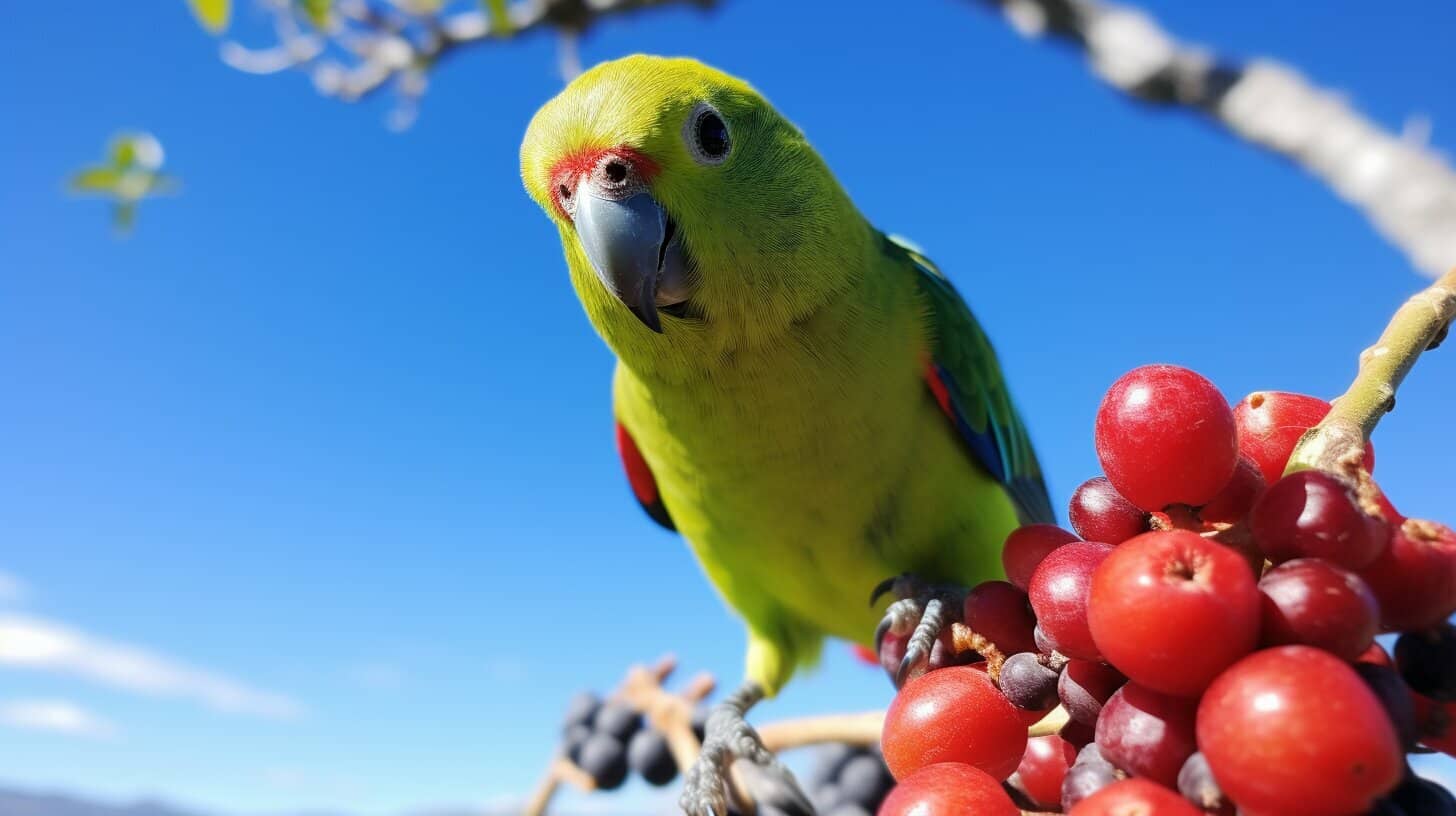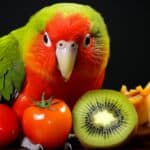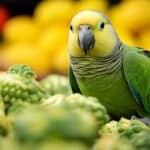If you’re a kakariki owner, you’re probably always looking for new food options to keep your feathered friend happy and healthy. But what about raisins? Can kakarikis eat raisins? In this section, we’ll dive into kakarikis and their dietary preferences, including whether or not they can safely consume raisins.
As herbivores, kakarikis require a varied diet, including fruits, vegetables, seeds, grains, and insects. However, you must know their dietary restrictions and avoid foods that may harm their health. Keep reading to discover more about kakarikis’ dietary needs and their compatibility with raisins.
Can kakarikis eat raisins? Yes, kakarikis can eat raisins. However, it’s essential to offer raisins in moderation as they are high in sugar. Too many can lead to obesity and other health issues. Always ensure that any treat given, including raisins, is free of additives and pesticides, and always provide plenty of fresh water.
Key Takeaways
- Kakarikis are primarily herbivores and need a varied diet to meet their nutritional needs.
- Raisins should only be given occasionally and in small quantities as a treat due to their high sugar content.
- Feeding kakarikis requires knowledge and understanding of their dietary needs and restrictions.
Understanding the Kakariki Diet
If you are a kakariki owner, it’s important to understand the dietary needs of these birds to ensure their health and well-being. Kakarikis are primarily herbivores and require a varied diet to meet their nutritional needs. A balanced diet for kakarikis should consist of:
- Fresh fruits, such as apples, grapes, and kiwi
- Leafy greens, such as kale, spinach, and lettuce
- Vegetables, such as carrots, peas, and sweet potatoes
- Seeds and nuts, such as sunflower seeds and almonds
- Grains, such as rice and quinoa
- A limited amount of protein from boiled eggs or insects
It’s important to note that certain foods can be harmful to kakarikis and should be avoided. These include:
- Avocado
- Chocolate
- Caffeine
- Alcohol
- Processed foods
- Foods excessively high in salt, sugar, or fat
Introduce new foods gradually to your kakarikis’ diet and observe their reaction to avoid any digestive problems. Avoid feeding your bird’s food that has passed its expiry date.
Exploring the Nutritional Value of Raisins
Raisins are a popular dried fruit that are widely consumed by humans. They are an excellent energy source and contain several essential vitamins and minerals, including vitamin C, potassium, and iron. Raisins also contain dietary fibre, which helps to regulate digestion and lower cholesterol levels.
When it comes to feeding birds, raisins can be a tasty treat. However, it’s important to consider their nutritional value and suitability for your bird’s diet. Although raisins contain some beneficial nutrients, they are also high in sugar and can be harmful in large quantities.
If you offer raisins to your kakarikis, it’s important to do so in moderation. Limit the amount to a few raisins and chop them into small pieces to avoid choking hazards. It’s also essential to monitor your bird’s reaction to the fruit and look for any signs of digestive problems or adverse reactions.
Kakarikis and Raisins: The Compatibility
While raisins are a popular human snack with some nutritional benefits, they are not the best food option for kakarikis. Raisins are high in sugar and can potentially cause digestive problems in these birds.
Furthermore, kakarikis have specific dietary restrictions to consider when selecting their food.
As primary herbivores, kakarikis require a varied diet of fruits, vegetables, seeds, and grains to meet their nutritional needs. Insects may also be included in their diet but in small amounts.
Feeding kakarikis a diet that does not meet their nutritional requirements can lead to health problems, such as malnutrition, obesity, and other illnesses. Therefore, knowing the proper food options for these birds is critical.
Instead of raisins, consider offering your kakarikis safe and healthy food alternatives, such as fresh fruits like apples, bananas, and berries, or vegetables like carrots, broccoli, and leafy greens. You can also offer them dried fruits like apricots and cranberries but in moderation. Always ensure that any food you provide to your kakarikis is free from pesticides and toxins.
Remember, the health and happiness of your kakarikis rely on providing them with a well-balanced and suitable diet. With a little knowledge and care, you can ensure that your feathered friends thrive and live a long, healthy life.
Safe and Healthy Treats for Kakarikis
Plenty of options are available if you’re looking for safe and healthy treats to offer your kakarikis. While raisins may not be the most suitable for these birds, you can still provide them with a variety of tasty treats to supplement their diet and keep them happy.
Apples, and bananas, can be a great alternative to raisins. These treats are nutrient-rich and can provide your kakarikis with a range of vitamins and minerals.
You can also offer your kakarikis other fresh fruits and vegetables, such as pears, carrots, and broccoli. These treats are low in calories and high in fibre, making them an excellent choice for maintaining a healthy diet. Make sure to chop these treats into small pieces to avoid choking hazards.
In addition to fruits and vegetables, you can also offer your kakarikis seeds and nuts as a treat. These can include sunflower seeds, pumpkin seeds, almonds, and walnuts. However, it’s essential to monitor the portion sizes, as these treats are high in fat. Additionally, make sure to avoid giving your kakarikis any salted or seasoned nuts, as these can be harmful to their health.
Remember to offer treats in moderation and as part of a balanced diet. Consult with a veterinary professional for specific dietary recommendations for your kakarikis.
Best Practices for Feeding Kakarikis
Kakarikis have some dietary restrictions, and feeding them requires a bit of knowledge and understanding. Below are some best practices to ensure a healthy and balanced diet for your feathered friends:
Offer a Balanced Diet
Kakarikis are primarily herbivorous and require a varied diet to meet their nutritional needs. Their diet should consist of fruits, vegetables, seeds, and grains. Try to include a range of options to ensure they get all the necessary vitamins and minerals.
Introduce New Foods Gradually
Kakarikis can be sensitive to new foods, so it’s essential to introduce them slowly and in small portions. This will allow them to adjust to the new food and prevent any digestive problems.
Avoid Toxic Foods
Some foods can be harmful or even toxic to kakarikis. Avoid feeding them chocolate, caffeine, alcohol, avocado, and any processed foods or foods with high fat and salt content.
Monitor Portion Sizes
Too much of any food, even healthy ones, can be harmful to your kakarikis. Monitor their portion sizes and adjust accordingly to prevent overfeeding.
Provide Fresh Water Daily
Kakarikis need fresh water every day to stay hydrated and healthy. Provide them with fresh water daily, and ensure it is easily accessible.
Consult with a Vet
If you’re unsure about any aspect of your kakarikis’ diet or health, consult a veterinarian knowledgeable about bird health.
Potential Risks of Feeding Raisins to Kakarikis
Raisins are high in sugar and can cause digestive problems in kakarikis if consumed in excess. Additionally, raisins can cause choking hazards, especially if fed to younger or smaller birds, as they may struggle to swallow them.
Moreover, some raisins may contain preservatives or sulphites, which can harm kakarikis and lead to respiratory issues. Certain brands of raisins may also be contaminated with pesticides or other toxins, posing a risk to your bird’s health.
It’s crucial to be aware of these potential risks and to avoid feeding raisins to your kakarikis altogether. Instead, opt for safer and healthier treat options, such as fresh fruits or dried fruits without added sugars or preservatives. By prioritizing your kakarikis’ health and well-being, you can ensure they live a long and happy life.
Recommended Diet for Kakarikis
If you want to provide your kakarikis with a well-balanced diet, consider including various fruits, vegetables, seeds, and grains. Here is a list of suitable options:
| Food Group | Examples |
|---|---|
| Fruits | Apples, berries, kiwi, melons, oranges |
| Vegetables | Bell peppers, broccoli, carrots, spinach, sweet potato |
| Seeds and Grains | Chia seeds, millet, sunflower seeds, oats, quinoa |
Remember to introduce new foods gradually and monitor your kakarikis’ reactions. Providing a varied diet is crucial for their health and happiness, but avoid feeding them any potentially harmful or toxic foods.
Conclusion
Feeding kakarikis raisins is not recommended due to their dietary restrictions and potential health risks. While these birds require a varied diet of fruits, vegetables, seeds, and grains, certain foods must be avoided. As responsible bird owners, it’s essential to understand their nutritional requirements and provide safe and healthy treats.
If you’re looking for alternative treats for your kakarikis, dried fruits free from added sugar and preservatives can be a good option. However, offering these treats in moderation and alongside a balanced diet is important to avoid upsetting their digestive system.
Remember to introduce new foods gradually to your kakarikis. This way, you can ensure they have enough time to adapt to new foods without any health problems. Always consult a veterinarian or avian specialist if you’re uncertain about your bird’s dietary needs or have any concerns regarding its health.
Following these best practices can provide your kakarikis with a nutritious and delicious diet.
FAQ
Q: Can kakarikis eat raisins?
A: Kakarikis can eat raisins, but they should only be fed in moderation and as a treat. Raisins are dried grapes and can be high in sugar, leading to weight gain and other health issues in kakarikis.
Q: What foods are suitable for kakarikis?
A: Kakarikis require a varied diet consisting of fruits, vegetables, seeds, grains, and some insects. Some safe food options for kakarikis include apples, pears, carrots, spinach, broccoli, millet, and sunflower seeds. It is important to provide a balanced diet to meet their nutritional needs.
Q: What is the nutritional value of raisins?
A: Raisins are dried grapes and contain a concentrated amount of nutrients. They are high in natural sugars, fibre, and certain vitamins and minerals.
Q: What are safe and healthy treats for kakarikis?
A: While raisins are not the best option for kakarikis, you can offer other safe and healthy treats. Dried fruits such as apricots, cranberries, and blueberries can be given in moderation. Choosing treats that are low in sugar and free from additives or preservatives is important.
Q: How should I feed kakarikis?
A: When feeding kakarikis, it is important to gradually provide a balanced diet and introduce new foods. Offer a variety of fruits, vegetables, seeds, and grains while monitoring their intake. Avoid sudden changes in their diet and be mindful of portion sizes to prevent overeating.
Q: Are there any risks in feeding raisins to kakarikis?
A: There are potential risks associated with feeding raisins to kakarikis. Raisins are high in sugar and can contribute to weight gain, gastrointestinal issues, and other health problems in these birds. It is best to avoid feeding raisins to ensure their well-being.
Q: What is the recommended diet for kakarikis?
A: The recommended diet for kakarikis includes a variety of fruits such as apples and pears, vegetables like carrots and spinach, millet and sunflower seeds, and grains. Providing a balanced diet that meets their nutritional requirements for optimal health is important.



Have comments or questions about this article? Then get involved!
Spotted an error or something we have missed? Let us know